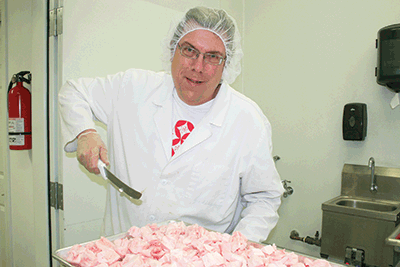“We’ve been able to do that through innovation and capital investment in new equipment,” he said. “We see additional business opportunity going forward.”
WaferTech, owned by Taiwan Semiconductor Manufacturing Co. (TSMC), is a foundry supplying chips on contract to a variety of clients – mobile phone manufacturers and others. Seagren couldn’t comment on the customer roster, but according to industry research, those clients include Altera, Qualcomm, Nvidia and Microsoft.
Financial update
In its latest financial report, TSMC said chip sales revenue in April jumped 23 percent from March and was up year-to-date by 14 percent over 2013. Analysts at Standard & Poor’s Capital IQ rate TSM shares a “strong buy” based on expected revenue increases this year of 14 percent and 17 percent in 2015 thanks to “next generation mobile devices.”
 In the first quarter, TSMC generated nearly $5 billion in revenue with earnings per share of 31 cents. That’s up from 26 cents a share in first quarter 2013. TSMC controls about half the world’s $38.9 billion chip-foundry business.
In the first quarter, TSMC generated nearly $5 billion in revenue with earnings per share of 31 cents. That’s up from 26 cents a share in first quarter 2013. TSMC controls about half the world’s $38.9 billion chip-foundry business.
Analysts said TSMC foundry process technology with faster chip performance and lower power consumption will enable the company to remain competitive. Maintaining “strict” operating discipline to reduce costs has been a key part of the company’s success strategy, they said.
Constructed in the early 1990s, WaferTech is among the larger chip foundries in the U.S and one of several operated around the world by TSMC.
Seagren said WaferTech management is not aware of any expansion plans at Camas, even though there’s room to grow there.
Chip industry challenges
While foundry operators such as TSMC have found new markets for their chips, Intel, the world’s largest chip maker continues to struggle with declining sales of personal computers and the chips that go in them. It appears that Intel, Oregon’s largest private employer with some 17,000 workers, is now targeting markets already supported by TSMC and others.
Others are also targeting the chip foundry business. South Korea’s Samsung is partnering with Texas-based Globalfoundries to go after more smartphone and tablet business.
According to Ian King writing for Bloomberg news, the foundry business is “gaining importance as more semiconductor companies decide not to produce their own designs, instead outsourcing the manufacturing to a few chipmakers that can afford to keep developing advanced production techniques.”
While competition may be getting stiffer for WaferTech, the demand for chips may be outstripping manufacturing supply.
{jathumbnail off}




